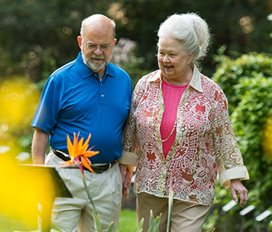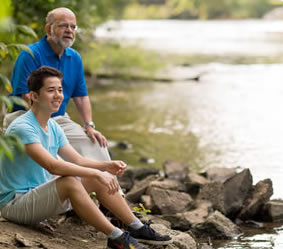Laws of Survivorship

Photo credit: Edda Pacifico
One patient's story of recovery after prostate cancer
contributed by Cathy Mellett
Even though he's a Michigan Law graduate, George Campbell's path to the University of Michigan for health care was somewhat circuitous.
When the East Lansing resident started having prostate trouble several years ago, he went to see an area physician. Campbell says, "The doctor told me, 'This is a problem of old men. Don't worry about it.' He didn't operate on men over 75. I was 73."
But Campbell's problem worsened, prompting him to travel out of state to visit a prominent national hospital. That doctor recommended "aggressive observation" and referred him to someone closer to home: the Rogel Cancer Center's John Wei, M.D., who specializes in prostate cancer detection.
"Luckily, Dr. Wei had a new way of doing a biopsy. When the results came back, he said, 'You should deal with this promptly instead of just watching it.'"
U-M surgeon John Hollingsworth, M.D., performed a radical prostatectomy to remove all of the prostate gland. "The first day after surgery, I felt like a truck had run over me, but I could see the benefits quickly. Before that, I had to use catheters to urinate," Campbell says.
Like most prostate cancer survivors, Campbell had to deal with the side effects of incontinence and erectile dysfunction (ED). Fortunately, he had help.
"At U-M, after the operation they don't just tell you to go home," he says. "They're there with you for support. With information. They let you know when something is to be expected or is a symptom of something else. It helps to talk with someone who knows what they're talking about."
For Campbell and his wife, Paula, that someone was Daniela A. Wittmann, Ph.D., a social worker and certified sex therapist, who specializes in the area of sexual recovery after chronic illness, with particular emphasis on prostate cancer.

~~George Campbell
Photo credit: Edda Pacifico
"Dr. Wittmann made a big difference in my recovery," Campbell says. "She let me know that yes, life is no longer 'normal,' and that you just have to realize things will be different for a while. My wife came to like the meetings with her and now says they’ve been very beneficial."
Wittmann says, "Many urologic cancer treatments have short- and long-term side effects. Common issues such as urinary, bowel, sexual health and emotional health can affect anyone, and probably all people struggle with at least one of these to some degree. That is why survivorship support is important. It's also important to include the caregiver and partner who has a special role in the patient’s recovery."
Today, Campbell is cancer-free and still working at his law practice , but is making more time for golf and other activities he thought he'd enjoy in retirement. He is enjoying life: as a husband, a father, a grandfather to five and a part-time lawyer.
Campbell says that he will continue to have the prostate specific antigen (PSA) test at his annual physicals. "And I still follow the exercises my physical therapist taught me, and which the doctor said I'll have to do for the rest of my life."
"The way I look at it, the problems are not major. The side effects have decreased. Right now, they can be worked around and lived with, and I have hope that the problems will go away altogether." Campbell says it also helps him to be of help to others. "I belong to a coffee group of old lawyers," he says. "We meet on a regular basis, and at least two of the men have had operations since I had mine. It was great to be able to talk with them, to let them know my experiences and to share with them that it will indeed get better with time.
"I want men to know that things really do get better -- and they get better fairly rapidly. Don't get discouraged.
"Mostly, I live life as I did before the diagnosis and the operation."
Continue reading the Fall, 2014 issue of Thrive
